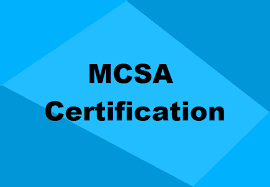Course information
MCSA (Microsoft Certified Solutions Associate) : is a certification program intended for people who seek entry-level jobs in an IT (information technology) environment. MCSA is a prerequisite for more advanced Microsoft certifications.
The MCSA certification covers three areas of knowledge: Installing and Configuring Windows Server 2012, Administering Windows Server 2012 and Implementing a Data Warehouse with Microsoft. Our MSCA course is specifically designed for people who are interested in becoming knowledgeable Microsoft Systems professionals in the future. This course is the first step to becoming a Microsoft Certified Systems Engineer (MCSE), an extremely sought-after credential.
Windows Server 2016 is the core of Microsoft’s Cloud vision that integrates global scale cloud infrastructure into your enterprise IT. MCSA Windows Server 2016 Training introduces users to various new capabilities in storage, networking, virtualization, VDI, information access, protection, etc. This MCSA certification will not only covers the essentials of the latest version of Windows Server but also take you through complete administration and advanced services of it. Users will also gain in-depth knowledge of latest management tools available for performing post-deployment tasks on Windows Server 2016.
MCSA
Overview:
MCSA (Microsoft Certified Solutions Associate) is an individual who has successfully passed exams dealing with the Microsoft Windows NT, 2000, 2003 XP, or later Microsoft operating system, networking, and Microsoft BackOffice server products. It is a widely recognized certification Program. According to the Organizations, the certification process is appropriate for systems engineers, systems analysts, technical support engineers, network analysts, and technical consultants.
Training Objectives of MCSA:
MCSA is the top level certification for the IT Oriented network professionals. It’s aimed for the IT professionals with a working knowledge of the Microsoft Windows and Server 2003 platform. This is made up with seven MCP certifications, and this certification qualifies you to administer and design complex networks on the Microsoft platform plus support desktop PC’s running Windows XP Professional, servers using Windows Server 2003 and includes a specialization that covers subjects such as Exchange Server 2003, SQL database and security.
Target Students and Prerequisites:
- Students must have experience in setting up Hardware and administering network systems.
- IMPLEMENTING MS WINDOWS 2003 NETWORK, PROFESSIONAL & SERVER (70-290) & (70-270)
Course Content:
Introduction to various types of file system.
Introduction to Windows 2003 network, XP-professional.
Administration of windows 2003network
Examine the network scope of Windows 2003 server
Introduction to LAN & WAN.
Networking topologies.
Examining to IP address (Class A, Class B, Class C)
OSI Reference Model
Connecting Windows 2003 server & XP professional in workgroup& Domain architecture
Creating &managing Local Users & Groups
The configuration of Printers (a) Local Printers (b) Network Printer
The configuration of Raid levels (Raid level 0,1&5)
Ensure file security through Encrypting file system (EFS)
IMPLEMENTING & ADMINISTERING MS WINDOWS 2003 DIRECTORY SERVICES (70-294)
Introduction to Active Directory Services (ADS)
The configuration of Active Directory Services by using DCPROMO
Implementing of Active Directory with DNS
Creation of Domain Users
Implementing Group Policies
Creation of Organizational Units
Moving Domain Users into other Organizational Units
Configuration of software Deployment using Adminpack (Group Policy)
Configuration of delegating administrative controls
Configuration of Distributed File System (DFS)
Creating Multiple links in DFS
Mapping Network Drive to access DFS from client
Configuration of Terminal Services at server side
Configuration of Remote Desktop using Terminal Services
Introduction to Trees & Forest
Introduction to Domain & Domain
IMPLEMENTING & ADMINISTERING, MS WINDOWS 2003 NETWORK INFRASTRUCTURE & DESIGNING (70-291)&(70-293) DISK QUOTAS
Introduction to Disk Quotas
- Applying Disk Quotas
- Setting Default limits
- Deleting user’s Quota Entries
- Applying log events
- Tracking Disk Space Users
- Adding new quota Entries
- Denying disk space to user DNS Installing
DNS
- Servers Integration of DNS with ADS
- Configuring a new Primary server
- Managing Forward lookup zone
- Managing Reverse lookup zone
- Adding records in zones
- Creating Associated Pointer Records in zones
DHCP
- Installing DHCP
- Creating Scopes
- Configuring DHCP clients
- Configuration of address Pool
- Configuration of address lease
- Updating DHCP statistics
- Assigning exclusion range from a scope
- Assigning Reservation for Particular client
Installing IIS
- Configuration of IIS for websites Configuration of ICS (Internet Connection Sharing)
- DESIGN A MICROSOFT WINDOWS 2003 SERVER ACTIVE DIRECTORY SERVICES & NETWORK INFRASTRUCTURE Enabling Routing & Remote Access
Introduction to RAS (or) PPP Server
- Configuration of RAS Server
- Configuration of RAS Client
- Assigning Permission for RAS users
Introduction to NAT Server
Introduction to VPN Server
Establishing a VPN Tunnel between two Networks
Configuration of VPN Clients
Introduction to tree & Forest
Introduction to Additional Domain Controller
Planning & Configuration of Additional Domain Controller
Introduction to Child Domain Controller
Configuration of Child Domain Controllers
Removing Child Domain Controller
Introduction to ADS Backups
- Introduction to tree & Forest
- Planning & Configuration of ADS
- Restoring ADS backup in ADS restore mode
- Restoring ADS backup in normal mode
- MS EXCHANGE 2003 SERVER & ADV. EXCHANGE 2003 SERVER (70 – 284)
Introduction to Microsoft exchange 2003 server
MAPI clients, LDAP standards
Public folders
Pre-Installation consideration(HW/SW Requirements)
Post-Installation Consideration
Managing Storage Groups
Creating a storage group
Creating a store(both mailbox & public store)
Moving a Mail Box
Deleting Mail Box, Public folder, Storage group
Retaining Deleted Objects
Public Folders
Understanding Public Folders
Managing Public Folders Trees
Creating & Deleting Public Folders
Exchange Internet protocol server & virtual services
SMTP, POP3, IMAP4, NNTP
Course information
- Course: MCSA ONLINE CLASSES
- Company: ArchiTech IT
- Course Content: Available
- Course Duration: 40-45 Days
- Session Recording: Lifetime Access
 ArchiTech IT
ArchiTech IT